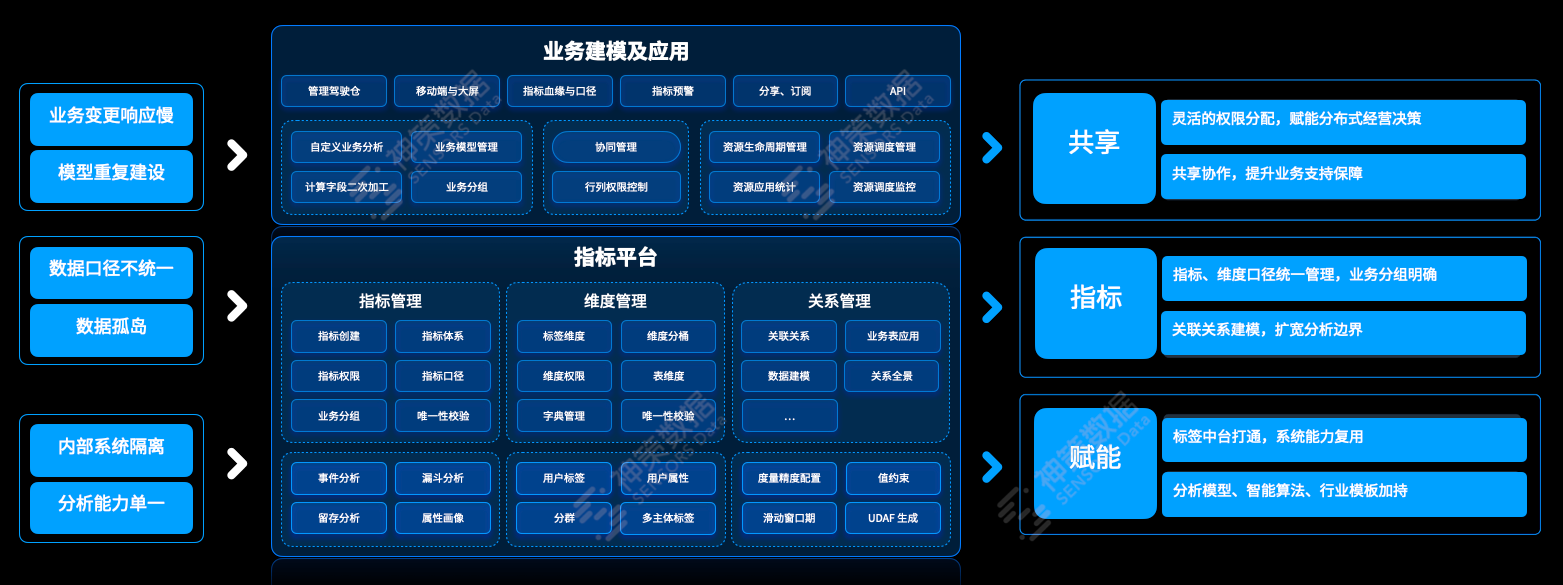Metrics Platform
|
Collect
About Metrics Platform
The value of the Metrics Management Platform lies in its ability to help businesses achieve data-driven management and decision-making. Through the Metrics Management Platform, companies can centrally manage and monitor key metrics in various business areas, identify problems and opportunities in a timely manner, and take quick action.
Sensors Metrics Platform focuses on the construction of metric calibers and data models, providing a one-stop solution to the problems of inconsistent metric calibers, low efficiency of metric applications, and isolation of user behavior data and business data. The functionality covers metric construction and management, dimension definition management, and relationship modeling. At the same time, Sensorsdata provides the ability to save analysis model results as metrics and integrate user tag data.
With the above capabilities, companies can use the Metrics Platform to apply tag middleware, user behavior data, and business operation data, helping business operations teams, metric management analysts, and data development teams to work more efficiently.

Different from traditional metrics platforms, Sensors Metrics Platform can directly encapsulate analysis models as metrics, incorporate the accumulations of behavioral analysis into the metrics platform, and provide flexible multidimensional configuration capabilities. This greatly improves the efficiency of metric construction, shortens the production chain from data to metrics, and ensures the unity and standardization of metric dimensions and calibers, making data calibers and processing logic clear and transparent.
For example, when a business leader needs the "user payment capability" metric with the dimension of region, the operations team does not need to go through the lengthy process of "tag" and "metric" request. They only need to complete multi-dimensional calculations through Sensors Metrics Platform, achieving comprehensive cost-effectiveness from days to minutes and self-service metric construction.
In the specific application process, Sensors Metric Platform also upgrades fine-grained permissions and collaborative management capabilities, helping companies solve resource consumption problems and implement digital operation strategies more efficiently.
Basic Concepts
Metric
Statistical definition: A metric (statistical term) is a concept that describes the comprehensive nature of the quantity characteristics of a population and its numerical values, so it is also called a comprehensive metric. -- from Baidu Baike
Metric in Sensors ecosystem: What is a metric: The calculation method of a certain measurable business fact under certain conditions.
- DAU
- Order quantity
- GMV
- ....
Purpose / Problem to be solved by metrics: The Metric Management Platform unifies the calculation caliber of metrics within the company, solving the problem of inconsistent metric calibers in the enterprise.
Dimension
A dimension is an angle of analysis metrics, generated based on the data source contained in the metric caliber and the lineage relationship with dimensions.
Related Relationship
"Related Relationship" is a flexible connection line created between logical tables in the data source: describing how two tables are interrelated based on common fields, but not merging the tables together. After creating the relationship between the two tables, the two tables still remain independent and do not form logical or physical tables, nor perform any data association calculations. When analyzing metrics from a table, the dimension of analysis is expanded through the established "related relationship."
Table Application Management
All access tables (database type tables) and system tables (Events, Users, Items) in Sensors Analysis will enter "Table Application Management". Users need to select standardized data tables in "Table Application Management" for display settings. The data tables with the "Data Table Application" switch turned on can be used for creating metrics, dimensions, and relationship.
Metric Analysis
Metric analysis supports analysis by simply selecting metrics, dimensions, filter conditions, etc. It also provides the capability to configure advanced analysis conditions, helping product and operations to analyze daily business data and assisting professional analysts in achieving advanced insights.
The application of metrics platform in analysis scenarios
In analysis scenarios, Sensors metrics platform provides enterprises with the ability to refine and connect metrics based on unified criteria. This capability spans from the underlying data to visual applications such as data dashboards, fully utilizing existing business data accumulation, providing clear criteria in various application scenarios, making the meaning, limitations, constraints, and underlying logic of each metric clear and traceable in data display scenarios. Using flexible self-service multi-dimensional analysis capabilities, the platform offers tools for decomposition analysis, releasing the potential value of metrics and meeting the needs of different roles and scenarios.
Note: The content of this document is a technical document that provides details on how to use the Sensors product and does not include sales terms; the specific content of enterprise procurement products and technical services shall be subject to the commercial procurement contract.
 Popular Searches
Popular Searches